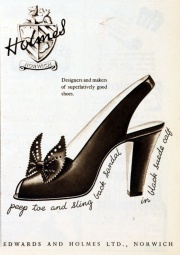Edwards and Holmes: Difference between revisions
No edit summary |
No edit summary |
||
| Line 1: | Line 1: | ||
[[image:ImILN02081947 011.jpg |thumb| 1947. ]] | [[image:ImILN02081947 011.jpg |thumb| 1947. ]] | ||
[[image:ImILN01251947 013.jpg |thumb| January 1947. ]] | |||
[[Image:Holmes.jpg|thumb|right|Edwards and Holmes]] | [[Image:Holmes.jpg|thumb|right|Edwards and Holmes]] | ||
of Esdelle Works, Norwich | of Esdelle Works, Norwich | ||
Latest revision as of 13:42, 9 May 2014



of Esdelle Works, Norwich
1922 Listed Exhibitor - British Industries Fair. Manufacturers of Gents' Courts, Oxfords and Slippers; Ladies' Machine Sewn Walking and Dress Shoes, Turn-shoes [1], Louis [2] and Wood Heels; Children's Machine Sewn, Turns, Veldts [3]. (Stand No. J.76) [1]
1947 Makers of brand KumFees
1948 Advert. [2]
Note: **
- [1] Turn shoes are stitched together inside-out. The leather is then soaked with water, and they are turned right-side-to. Hence the name "turn" shoes.
- [2] Louis Heels - Around 1660, a shoemaker named Nicholas Lestage designed high heeled shoes for Louis XIV. Some were more than four inches, and most were decorated in various battle scenes. The resulting high "Louis heels" subsequently became fashionable for ladies. Today the term is used to refer to heels with a concave curve and outward taper at the bottom similar to those worn by Madame de Pompadour, Louis XV's mistress. They are also sometimes called "Pompadour heels." [3]
- [3] Veldt-shoe, originally a South African shoe of untanned hide made so that the edges of the upper were turned outwards to form a flange which was generally made inside out with upper and sole attached to one another by thonging or thread stitching; the lasting margin of the upper was sewn to a sole composed of only one layer of material so that, when the shoe was turned right side out, the seam was inside as was also the flesh side of the leather.

